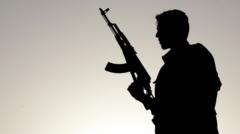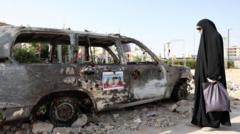The Kurdistan Workers' Party's announcement to cease hostilities marks a significant turning point in Turkish-Kurdish relations and may reshape regional dynamics.
Kurdistan Workers' Party Announces End of Armed Conflict with Turkey

Kurdistan Workers' Party Announces End of Armed Conflict with Turkey
A Historic Shift Toward Peace and Political Resolution
In a remarkable announcement, the Kurdistan Workers' Party (P.K.K.) declared on Monday its intention to lay down arms and end its long-standing insurgency against the Turkish state, a move that holds substantial implications not just for Turkey but for neighboring countries as well. The decision follows a recent appeal from the group's imprisoned leader, Abdullah Ocalan, who suggested that the time had come for the P.K.K. to disarm, stating that their armed struggle had lost its initial purpose.
Initially formed as a secessionist movement aimed at establishing an independent Kurdish state in Turkey, the P.K.K. has evolved into a group advocating for increased rights for the Kurdish population within the country. In their official statement, the P.K.K. claimed it has elevated the Kurdish issue to a point where a solution can be reached through democratic means, asserting that it has achieved its mission in this regard.
The group has expressed that Mr. Ocalan should oversee the disarmament process, while also calling on the Turkish Parliament to engage in discussions about moving forward. This development could potentially resolve one of Turkey's most significant security dilemmas, providing a substantial political win for President Recep Tayyip Erdogan.
The ramifications of this decision extend beyond Turkey, as it may influence various Kurdish militias active in Syria and shift broader regional dynamics. Historically, the Kurdish population—numbering around 40 million and residing across Turkey, Syria, Iran, and Iraq—have faced systemic oppression, with their cultural and linguistic rights often suppressed by state authorities.
While specific impacts on P.K.K. positions in the mountainous regions of northern Iraq remain uncertain, Turkish military operations aimed at these strongholds are expected to continue. Officially, Turkey has maintained that no concessions were made to compel the P.K.K. to disarm. However, representatives from Turkey's leading pro-Kurdish party have indicated hope for potential advancements in cultural and educational rights for Kurds as part of the ongoing dialogue.
This landmark announcement signifies a critical juncture in a conflict that has claimed over 40,000 lives and poses the possibility of a new era of collaboration and understanding between the Turkish government and its Kurdish population.





















